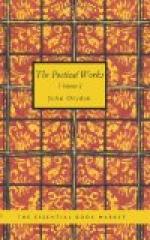Then for the style, majestic and
divine,
It speaks no less than God in every line:
Commanding words; whose force is still
the same
As the first fiat that produced our frame.
All faiths beside, or did by arms ascend;
Or, sense indulged, has made mankind their
friend:
This only doctrine does our lusts oppose—
Unfed by Nature’s soil, in which
it grows;
Cross to our interests, curbing sense,
and sin; 160
Oppress’d without, and undermined
within,
It thrives through pain; its own tormentors
tires;
And with a stubborn patience still aspires.
To what can reason such effects assign,
Transcending nature, but to laws divine?
Which in that sacred volume are contain’d;
Sufficient, clear, and for that use ordain’d.
But stay: the Deist here will
urge anew,
No supernatural worship can be true:
Because a general law is that alone
170
Which must to all, and every where be
known:
A style so large as not this Book can
claim,
Nor aught that bears Reveal’d Religion’s
name.
’Tis said the sound of a Messiah’s
birth
Is gone through all the habitable earth:
But still that text must be confined alone
To what was then inhabited, and known:
And what provision could from thence accrue
To Indian souls, and worlds discover’d
new?
In other parts it helps, that ages past,
180
The Scriptures there were known, and were
embraced,
Till sin spread once again the shades
of night:
What’s that to these who never saw
the light?
Of all objections this indeed is
chief
To startle reason, stagger frail belief:
We grant, ’tis true, that Heaven
from human sense
Has hid the secret paths of Providence:
But boundless wisdom, boundless mercy
may
Find even for those bewilder’d souls
a way.
If from His nature foes may pity claim,
190
Much more may strangers who ne’er
heard His name.
And though no name be for salvation known,
But that of his Eternal Son alone;
Who knows how far transcending goodness
can
Extend the merits of that Son to man?
Who knows what reasons may His mercy lead;
Or ignorance invincible may plead?
Not only charity bids hope the best,
But more the great apostle has express’d:
That if the Gentiles, whom no law inspired,
200
By nature did what was by law required;
They, who the written rule had never known,
Were to themselves both rule and law alone:
To nature’s plain indictment they
shall plead;
And by their conscience be condemn’d
or freed.
Most righteous doom! because a rule reveal’d
Is none to those from whom it was conceal’d.
Then those who follow’d reason’s
dictates right,
Lived up, and lifted high their natural




